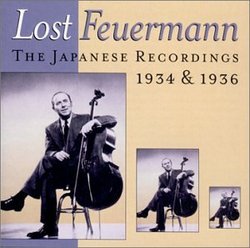| All Artists: Feuermann, Rebner, Kitzinger Title: Lost Feuermann: Japanese Recordings 1934 & 1936 Members Wishing: 0 Total Copies: 0 Label: Music & Arts Program Original Release Date: 1/1/1934 Re-Release Date: 1/23/2001 Genres: Special Interest, New Age, Pop, Classical Styles: Meditation, Vocal Pop, Opera & Classical Vocal, Ballets & Dances, Waltzes, Chamber Music, Forms & Genres, Concertos, Historical Periods, Classical (c.1770-1830), Instruments, Strings Number of Discs: 1 SwapaCD Credits: 1 UPC: 017685107528 |
Search - Feuermann, Rebner, Kitzinger :: Lost Feuermann: Japanese Recordings 1934 & 1936
 | Feuermann, Rebner, Kitzinger Lost Feuermann: Japanese Recordings 1934 & 1936 Genres: Special Interest, New Age, Pop, Classical
In 1942, just as Emanuel Feuermann was escaping the shadow of Pablo Casals, he died, the result of a botched routine surgery. He was only 39--Casals's age when he cut his first records in 1915. This irony was compounded in... more » |
Larger Image |

 Track Listings (18) - Disc #1
Track Listings (18) - Disc #1